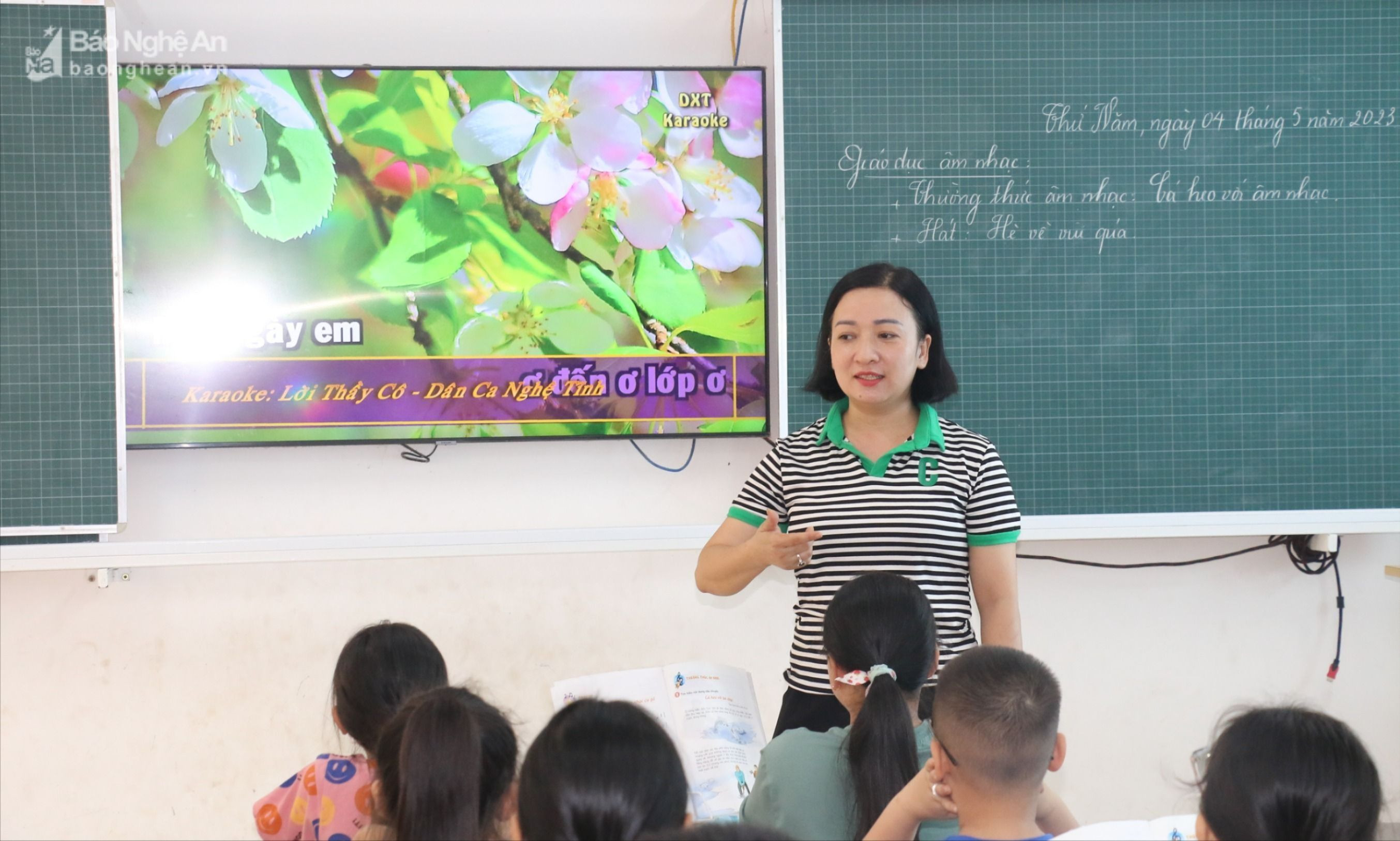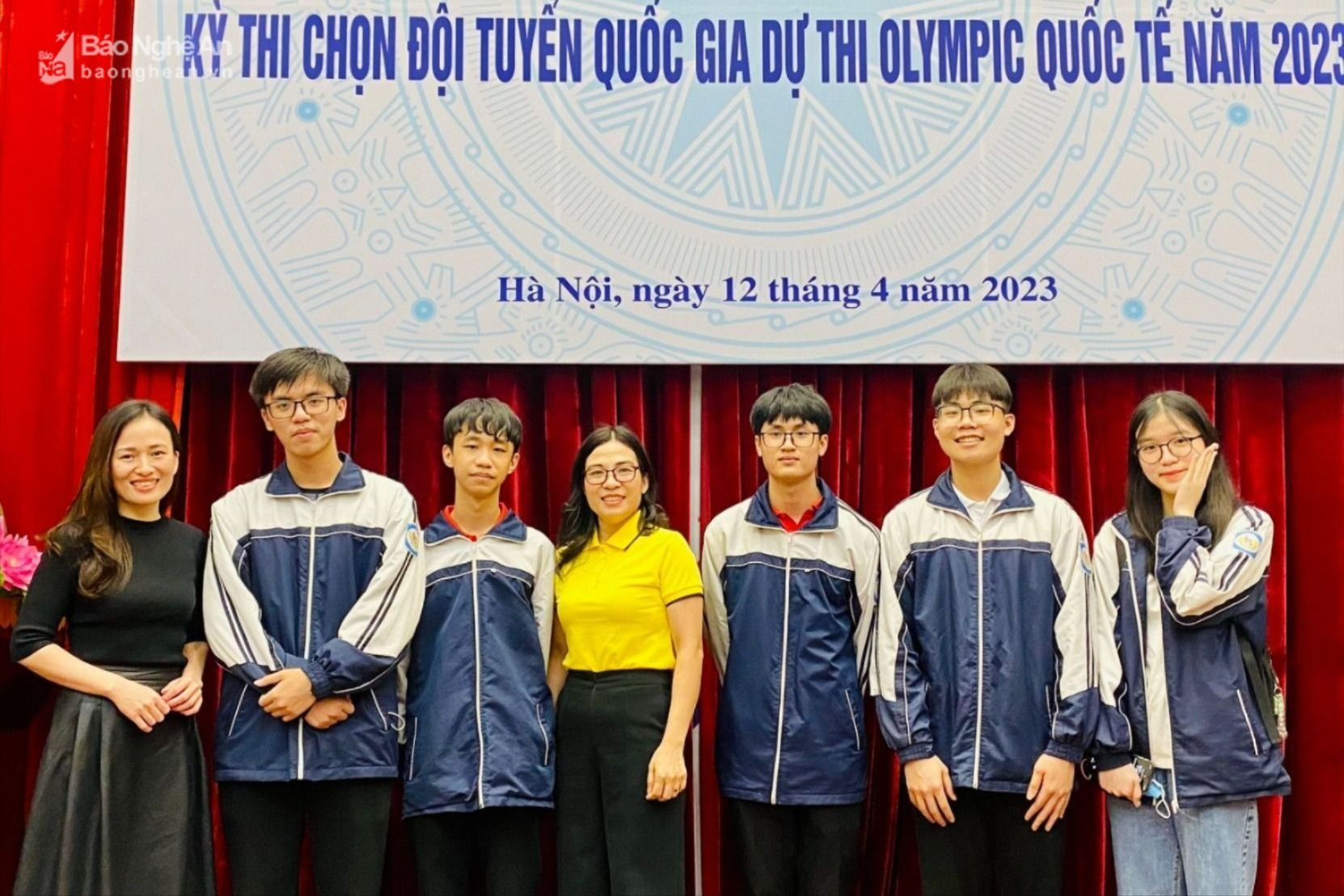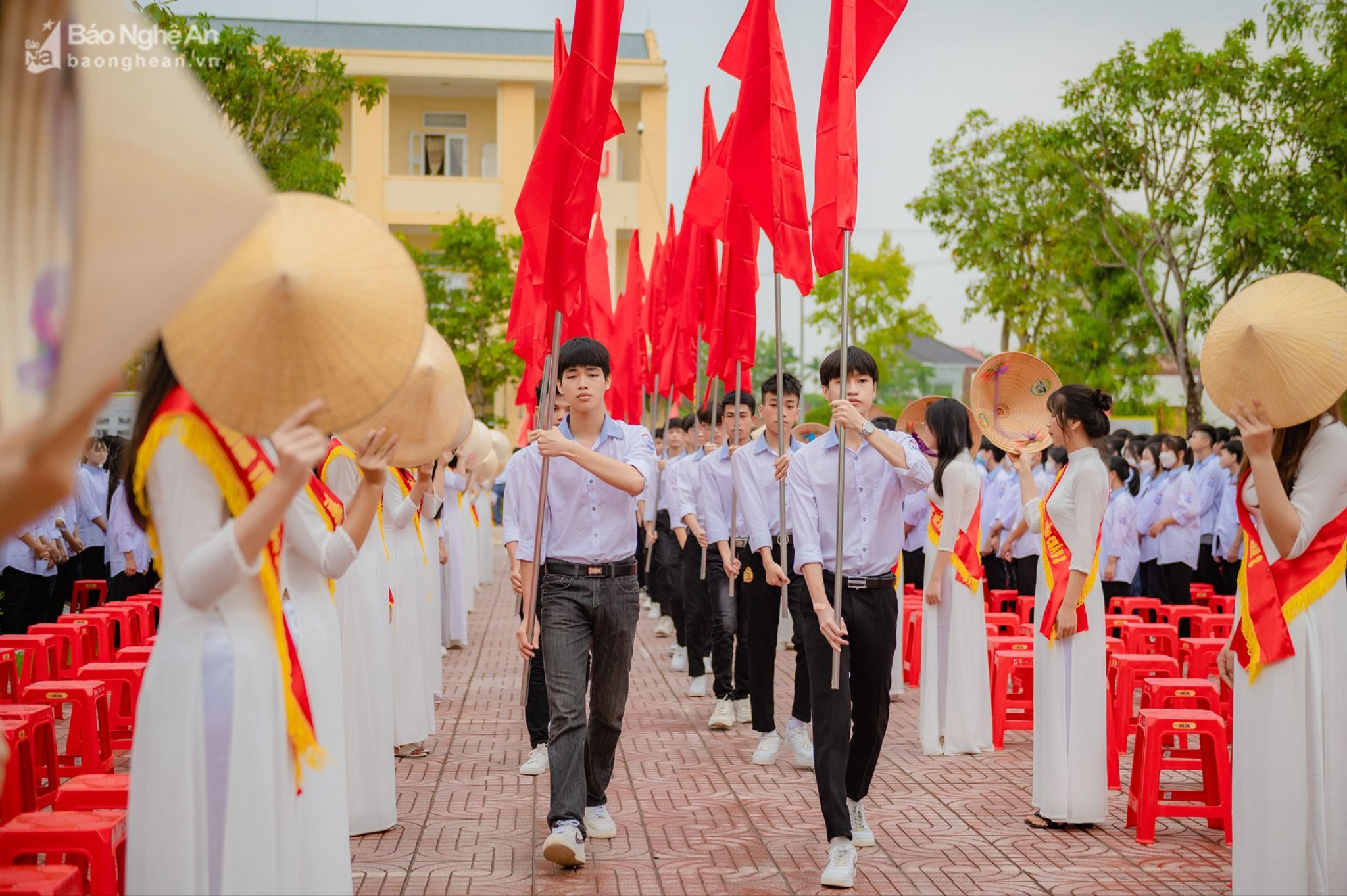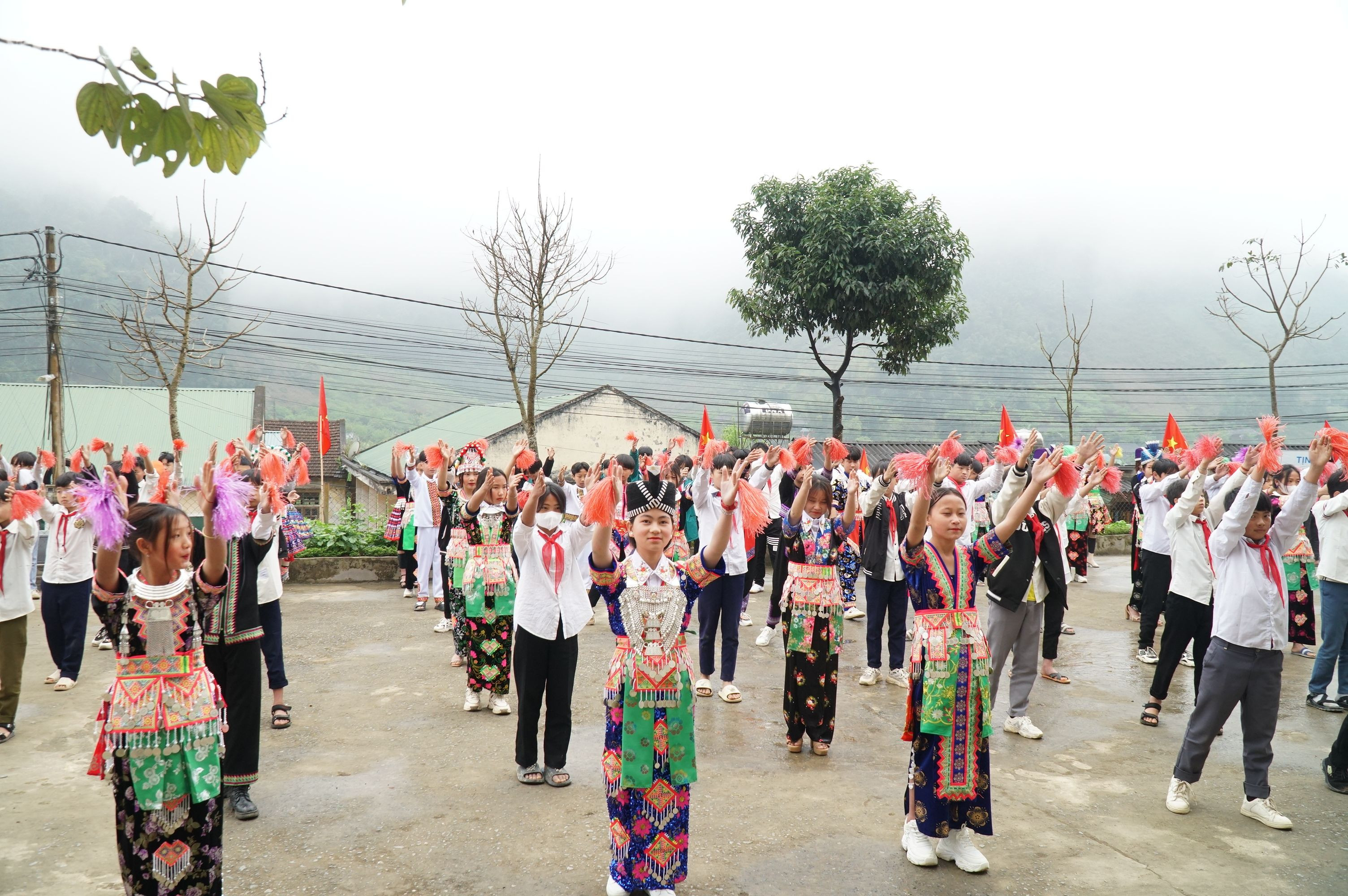Nâng cao chất lượng giáo dục đại trà, đứng tốp đầu cả nước là mục tiêu của giáo dục Nghệ An
(Baonghean.vn) - In 2023, it will be 10 years since Resolution No. 29-NQ/TW of the 11th Party Central Committee on fundamental and comprehensive innovation of education and training was put into implementation.
Nghe An Newspaper had a conversation with Prof. Dr. Thai Van Thanh - Member of the Provincial Party Executive Committee, Director of Nghe An Department of Education and Training about the implementation of the Resolution in the province.
P.V:Dear Professor, Dr. Thai Van Thanh, Resolution No. 29 is considered a breath of fresh air blowing into education and training to open up a comprehensive innovation direction for the country’s education and training system. In Nghe An, how do you evaluate the implementation process and results?
Prof. Dr. Thai Van Thanh:After 10 years of implementing Resolution No. 29 of the Party Central Committee oncomprehensive educational reformand training in the conditions of market economy, socialist orientation and international integration, Nghe An Education and Training sector under the leadership of the Provincial Party Committee, People's Council and Provincial People's Committee has achieved many good results.
First of all, we affirm that it is the close, systematic, methodical and timely direction of the Provincial Party Committee and the Provincial People's Council by issuing many resolutions and action programs and the Provincial People's Committee has issued many projects and plans associated with local realities and created synchronization in the entire political system in implementation.

Thanks to that, cadres, teachers, parents and people in the province have basically agreed and supported the implementation of policies and guidelines on educational innovation in recent years, especially the implementation of the 2018 General Education Program and textbooks, new school models and local educational activities. Looking back at 10 years of implementation, the first achievement that we can affirm is that the province's comprehensive, high-quality human resources have made significant progress, meeting the development needs of the province and the North Central region. The system of facilities and the network of spacious, synchronous and modern schools have gradually approached the region and affirmed the position and brand of Nghe An education in the national education system nationwide.
In addition, the quality of key education continues to be maintained, the number of excellent students at national and international levels is always leading the country. In recent years, Nghe An has had Gold, Silver, Bronze medals at regional and international levels every year. That is the pride of Nghe people, affirming the studiousness and creativity of Nghe An students. A remarkable result is that the quality of mass education has been gradually improved and has clearly developed and progressed; from 46th out of 63 provinces and cities to 38th, 36th and in the last 2 years Nghe An has ranked 20th, 22nd out of 63 provinces and cities. With this solid result, we continue to improve the quality of mass education, striving to be at the top of the country.
That is also the long-term goal of Nghe An education, demonstrating responsibility to the leaders, the people, the students of the province and worthy of the tradition of studiousness of the people of Nghe An.

Over the years, Nghe An's teaching staff has developed in both quantity and quality, gradually synchronizing the structure. The quality of teachers is demonstrated in the above-standard training. In scientific and professional conferences organized by the Ministry of Education and Training, international conferences, Nghe An's teaching staff has participated very actively, affirming their position and capacity.
In particular, in implementing the new 2018 General Education Program, Nghe An has built a number of models and methods, forms of organizing teaching and assessment according to the development of students' qualities and capacities, which have been replicated by the Ministry of Education and Training into pilot models nationwide.
A very noteworthy issue is that comprehensive education is getting better and better, the pedagogical environment is healthy, students in remote areas, ethnic minority areas are gradually invested by the province to create an equal educational environment. From here, helping Nghe An students meet the requirements of international integration and the 4th industrial revolution.
P.V:To comprehensively reform education and training, the teaching staff plays a very important role. In recent years, how has the work of developing the team of teachers, civil servants, public employees and educational management staff of the province had positive changes, sir?
Prof. Dr. Thai Van Thanh:In recent years, the Party Committee and the Government have issued many policies, mechanisms and guidelines and carried out reviews and rearrangements of the teaching staff and educational management staff to meet the requirements of innovation. At the same time, every year, they direct and advise on the approval of educational development plans for units in the area, as a basis for developing and advising on the approval of the number of employees and job positions for units, basically meeting the requirements and tasks for each school year.
The reception, recruitment, transfer and streamlining of staff are carried out according to the correct job positions and professional titles, ensuring that the teaching staff is basically sufficient in number, synchronous in structure, and in accordance with the local school network planning. Thanks to that, up to now, the qualifications of teachers have been increasingly improved; maintaining the rate of 100% of preschool, general and professional teachers meeting training standards; gradually increasing the rate above training standards.

If in 2014 there were 76.4% of preschool teachers, 88.6% of primary school teachers, 82.3% of secondary school teachers, and 20.3% of high school teachers above standard, now there are 80.4% of preschool teachers, 89.6% of primary school teachers, 84.3% of secondary school teachers, and 21.3% of high school teachers above standard.
Implementing the new general education program, Nghe An is one of the leading localities in training and fostering teachers to ensure the roadmap for implementing the new textbook replacement program.
The province also directed all levels and sectors to advise and implement policies and regimes for teachers and educational managers fully and promptly.
In addition to the policies issued by the Central Government, the Provincial Party Standing Committee has directed and advised on the effective implementation of a number of policies suitable for the locality, such as: mechanisms and policies for Phan Boi Chau Specialized High School, salary regime for teachers who do not meet the requirements of their tasks, 2-session/day teaching regime for primary school teachers and teachers of ethnic boarding schools, payment regime in kindergartens organizing teaching on holidays, supporting schools to meet national standards, regimes and policies for staff working at the Department of Education and Training...
Many local Party committees have directed and issued mechanisms and policies to increase talent attraction, recruitment, and rewards to promote educational activities in the area.
For example, Dien Chau district established a "Teaching Talent" Fund to reward teachers with high achievements; Quy Chau district established a "Teaching Talent" Fund to reward cadres, teachers and employees with outstanding achievements every year; Hung Nguyen district encouraged schools to support working expenses for seconded teachers...
P.V:Nghe An is the first province in the country to implement a quality assurance model in general education institutions. This is also considered a breakthrough solution to implement Resolution 29 on comprehensive fundamental innovation in education and training. So what are the core elements of this model when implemented in practice?
Prof. Dr. Thai Van Thanh:The Department of Education and Training has deployedquality assurance modelgeneral education from 2020 and after a pilot period, advised the Provincial People's Committee to issue a plan to ensure the quality of general education in Nghe An province. This model is a leader in the country in implementing the quality of general education.

To improve the quality of comprehensive education and develop learners' capacities and qualities, it is necessary to manage the quality of education in accordance with educational goals and synchronously implement quality management measures of schools, including ensuring contextual factors, ensuring input factors, ensuring teaching and learning process factors, ensuring output factors...
The key point in the model is to have an input test to review and evaluate the capacity, qualities, habits, and cultural capital of students. Thereby, there is concretization and differentiation to conduct teaching and have specific measures to impact each student so that they can progress and mature. During the implementation process, schools have signed a commitment to the quality and responsibility of each student and each class associated with each subject, not to mention general quality. The commitment to implementing output standards will create a certain pressure, but it is also a motivation for each teacher, principal, and school to strive to improve the quality of comprehensive education in substance.
In fact, after nearly 3 years of implementation, although it is not possible to evaluate and have many specific numbers, the quality of education in the province has had clear changes. Through the inspection and direction of the department, it is initially seen that general education institutions have had many positive changes in awareness and action.
Especially the innovation of school governance by principals, striving to build a culture of quality, taking learners as the center.
P.V:The implementation of the new general education program, in addition to advantages, also has difficulties and challenges. So, in the coming time, how will the industry implement to achieve the set goals?
Prof. Dr. Thai Van Thanh:Despite efforts, we must frankly look at the shortcomings and limitations such as the quality of education and training is not really a driving force for breakthroughs, a competitive resource of the province in socio-economic development; in some aspects it has not met the requirements and aspirations of the people and the labor market. The quality of mass education has changed positively but slowly; there are differences between regions. The team of teachers and educational managers still has shortcomings in quality, quantity, structure, and remuneration policies. The situation of local surplus and shortage of teachers has not been completely resolved...

Trong thời gian tới, ngành tiếp tục tham mưu cho Tỉnh ủy, HĐND, UBND tỉnh ban hành các đề án, chính sách để quán triệt các nghị quyết của Trung ương vào thực tiễn ở Nghệ An. Đồng thời, có chính sách quan tâm đặc thù của tỉnh dành cho giáo dục, nhất là với những huyện miền núi cao và học sinh là người dân tộc thiểu số.
Bên cạnh đó, thực hiện một cách đồng bộ, bài bản, rà soát lại hệ thống trường lớp, dồn dịch các điểm trường để xây dựng trường đồng bộ, khang trang, hiện đại. Toàn ngành cũng sẽ tiếp tục thúc đẩy chuyển đổi số để đổi mới công tác quản trị nhà trường gắn với cải cách hành chính. Từ đó, tạo đột phá để thực hiện Nghị quyết 29 và Nghị quyết Đại hội Đảng các cấp.
Đồng thời, thực hiện tốt công tác đào tạo đội ngũ nhà giáo để được cập nhật thường xuyên những cái mới, nhằm đáp ứng yêu cầu ngày càng cao của sự nghiệp giáo dục. Tiếp tục thực hiện các mô hình mà chúng ta đã xây dựng, hoàn thiện và phát triển, lấy mô hình đảm bảo chất lượng làm nòng cốt và tích hợp với các mô hình trường trọng điểm, trường tiên tiến, trường học hạnh phúc, trường học thực hiện công tác xã hội để xây dựng trường học an toàn, lành mạnh, phòng, chống bạo lực học đường, trường học tự quản về an ninh, trật tự.
P.V:Xin cảm ơn ông về cuộc trò chuyện!


